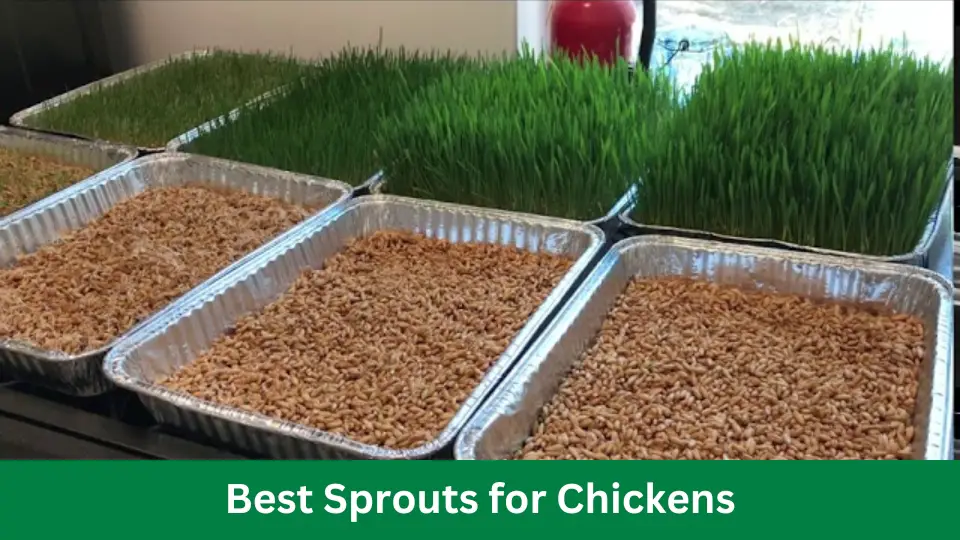The best sprouts for chickens are alfalfa, clover, and sunflower sprouts, providing essential nutrients for their growth and health. Chickens benefit from these sprouts as they are rich in vitamins, minerals, and antioxidants, promoting strong bones and feathers and boosting their immune system.
Chickens require a balanced and nutritious diet to maintain optimal health and productivity. While commercial feeds are commonly used, chickens can benefit from sprouts. Sprouts are young plants that have just emerged from seeds and are packed with essential nutrients.
They are an affordable and easy way to provide chickens with fresh greens and additional vitamins and minerals. We will explore the best sprouts for chickens, including their benefits and how to incorporate them into their diet. Understanding the benefits and options available can enhance your chickens’ overall well-being while promoting their natural foraging instincts.
Choosing The Right Sprouts For Chickens
When it comes to feeding your chickens, providing a well-balanced diet is essential for their health and productivity. One way to enhance their diet is by offering sprouts packed with essential nutrients easily be grown at home.
However, not all sprouts are suitable for chickens. To ensure you’re choosing the right sprouts for your feathered friends, consider their nutritional needs and select safe sprouts to consume.

Consider The Nutritional Needs
Chickens have specific nutritional requirements that vary depending on their age and purpose. As their caregiver, it’s important to understand these needs and provide them with the right balance of nutrients. When selecting sprouts for your chickens, consider the following nutritional factors:
- Protein: Chickens require good protein for growth and feather production. Sprouts high in protein, such as alfalfa sprouts or mung bean sprouts, can be an excellent choice.
- Vitamins and Minerals: Chickens need a variety of vitamins and minerals for overall health. Select sprouts rich in vitamins A, B, and C and minerals like calcium, potassium, and iron.
- Antioxidants: Including sprouts that are rich in antioxidants, such as broccoli sprouts or radish sprouts, can help boost your chickens’ immune system and protect them from diseases.
- Fiber: Just like humans, chickens benefit from a diet high in fiber. Look for sprouts with a good amount of dietary fiber, like sunflower or wheatgrass sprouts, to help their digestion.
Select Sprouts Suitable For Chickens
Not all sprouts are safe for chickens to consume. Some sprouts may contain toxins or be difficult to digest for these poultry birds. To ensure their safety, it’s important to select sprouts that are known to be suitable for chickens.
Here are some chicken-friendly sprouts to consider:
| Sprout Type | Safety for Chickens |
|---|---|
| Alfalfa Sprouts | Safe and nutritious, high in protein |
| Mung Bean Sprouts | Safe and nutritious, high in protein |
| Broccoli Sprouts | Safe and rich in antioxidants |
| Radish Sprouts | Safe and rich in antioxidants |
| Sunflower Sprouts | Safe and high in fiber |
| Wheatgrass Sprouts | Safe and high in fiber |
By considering the nutritional needs of your chickens and selecting the right sprouts, you can provide them with a healthy and diverse diet that promotes their overall well-being.
Sprouts offer added nutrients and a variety of flavors and textures to their meals, keeping them happy and satisfied. So start growing sprouts today and watch your chickens thrive!
Growing Sprouts For Chickens
Growing sprouts for chickens is a cost-effective and nutritious way to provide your flock with fresh greens year-round. Sprouts contain essential vitamins, minerals, and enzymes that boost chicken health and promote optimal egg-laying.
Plus, sprouting seeds is a fun and easy project at home. To get started, follow these steps to ensure successful and healthy sprouts for your chickens.
Select The Right Seeds
When choosing seeds for sprouting, it’s essential to select varieties that are safe and beneficial for chickens. Opt for organic, non-GMO seeds recommended for sprouting purposes.
Suitable seeds include sunflowers, alfalfa, wheatgrass, radishes, and buckwheat. Avoid using seeds coated with fungicides or pesticides, as these chemicals can harm your chickens.
Prepare The Sprouting Container
A clean and suitable sprouting container is crucial for successful sprout growth. You can use a wide range of containers, such as Mason jars with screens, sprouting trays, or even a dedicated sprouting container with a built-in drainage system.
Ensure that the container is thoroughly cleaned and sanitized before use to prevent the growth of harmful bacteria or mold.
Soak And Rinse The Seeds
Before sprouting, it’s essential to soak the seeds overnight to kickstart the germination process. Place the seeds in the sprouting container and cover them with filtered water.
Allow the seeds to soak for approximately 8 to 12 hours, then drain the water. Rinse the seeds thoroughly with clean water to remove any residue and ensure fresh and clean sprouts.
Provide Optimal Sprouting Conditions
To promote healthy sprout growth, provide optimal sprouting conditions for your seeds. Place the sprouting container in a warm, well-ventilated area away from direct sunlight.
The ideal sprouting temperature is around 70°F to 80°F. Maintain proper moisture by rinsing the sprouts twice a day and ensure proper airflow by gently agitating the seeds.
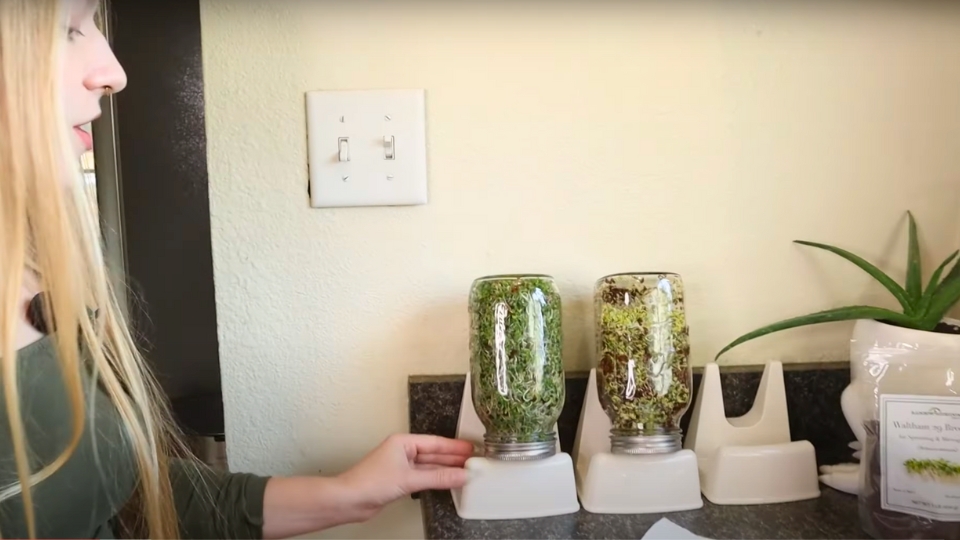
Harvesting The Sprouts
Once the sprouts have reached the desired length, usually around 2 to 3 inches, it’s time to harvest them for your chickens.
Gently remove the sprouts from the sprouting container and rinse them for the last time to remove any loose hulls or debris. Serve the freshly harvested sprouts to your chickens, and watch them enjoy the nutritious treat!
Actual Introducing Sprouts To Your Flock
Introducing sprouts to their diet can be a game-changer for keeping chickens healthy and happy. Sprouts are packed with nutrients, vitamins, and minerals to support your flock’s overall well-being.
Whether you have a large flock or just a few backyard chickens, incorporating sprouts into their diet can be simple and rewarding. For best results, offer sprouts as treats and gradually mix them with regular feed to introduce sprouts to your chickens.
Gradual Introduction
Introducing sprouts to your flock should gradually allow their digestive systems to adapt. Start by offering a small amount of sprouts mixed with their regular feed. Monitor their response and observe any changes in their droppings or behavior.
This slow introduction will help prevent any sudden digestive upsets that could occur if they were given a large quantity of sprouts all at once. Over time, you can gradually increase the sprouts you provide your chickens.
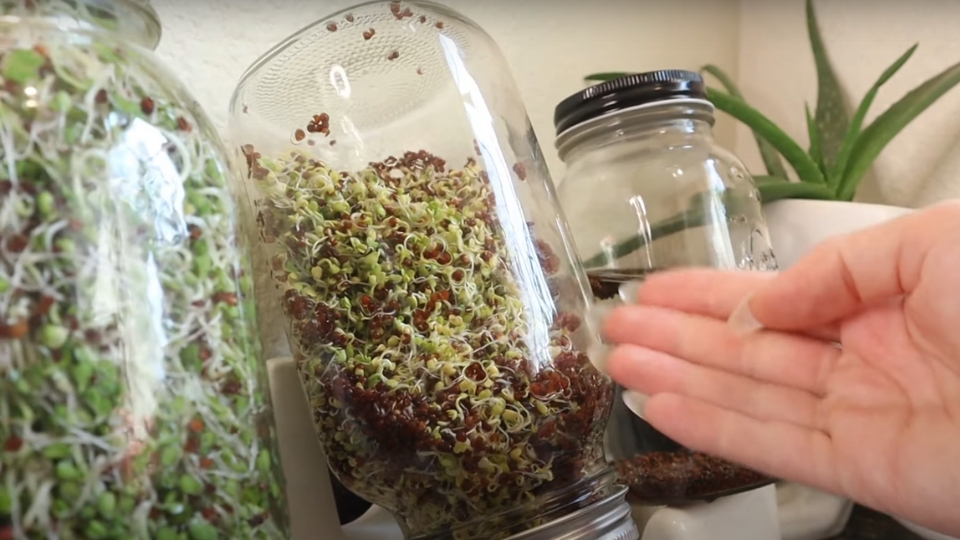
Offering Sprouts As Treats
In addition to their regular feed, offering sprouts as treats can be a fun and interactive way to engage with your chickens. Chickens love to peck and scratch, so scatter some sprouts in their outdoor run or toss them into their coop. This will encourage natural foraging behaviors and keep them entertained.
Not only will this provide mental stimulation, but it will also allow your chickens to experience the taste and texture of fresh sprouts. Be cautious not to overfeed on treats, as they should only make up a small portion of their diet.
Mixing Sprouts With Regular Feed
Mixing them into their regular feed is important to ensure your chickens receive all the necessary nutrients from their sprouts. This will help balance their diet and prevent nutritional imbalances. Combine the sprouts with their feed, ensuring that it is well-mixed.
Sprouts will add variety and flavor to their meal and provide an extra boost of nutrition. Incorporating sprouts into their regular feed ensures your chickens get the best of both worlds.
By gradually introducing sprouts, offering them as treats, and mixing them with regular feed, you can provide your flock with freshness and additional nutritional benefits. Monitor their response as you introduce sprouts and ensure they receive a balanced diet. Your chickens will surely thank you for the extra treat and the added health benefits!
Best Common Sprouts For Chickens
Regarding backyard chickens’ diet, sprouts are nutritious and healthy. Common sprouts for chickens provide a range of benefits, including boosting their immune system, providing essential vitamins and minerals, and increasing their overall health and vitality. This article will explore some of the best sprouts for chickens and their unique benefits.
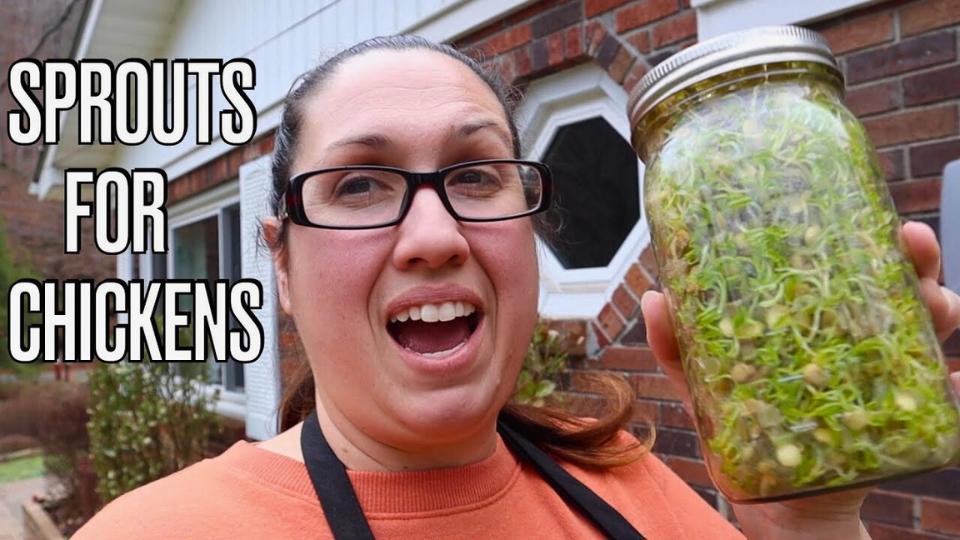
Alfalfa Sprouts
Alfalfa sprouts are a popular choice for feeding chickens due to their high nutritional content. These sprouts are rich in protein, vitamins A, B, C, D, E, and K, as well as calcium, iron, and magnesium.
Added alfalfa sprouts to their diet can enhance egg production, support healthy feather growth, and improve your flock’s overall well-being. To feed your chickens alfalfa sprouts, rinse them thoroughly and offer them as a fresh treat.
Sunflower Sprouts
Sunflower sprouts are another excellent choice for your chickens’ diet. These sprouts contain vitamins, including A, B complex, C, D, and E, and essential minerals such as calcium, iron, and phosphorus. Sunflower sprouts enhance chicken immunity and promote healthy digestion.
You can easily grow these sprouts at home by soaking sunflower seeds and allowing them to sprout for a few days. Once sprouted, offer them to your chickens as a tasty treat.
Wheatgrass
Wheatgrass is a highly nutritious sprout that provides numerous benefits to chickens. Packed with essential vitamins, minerals, and antioxidants, wheatgrass can improve egg quality, support healthy digestion, and strengthen the immune system.
Growing wheatgrass for your flock is simple: sprout wheat seeds and allow them to grow into grass. Trim the wheatgrass and offer it to your chickens for a delicious and nutrient-rich snack.
Barley Sprouts
Barley sprouts are considered a nutrition powerhouse for chickens. These sprouts are rich in vitamins A, B, C, and E and minerals like calcium, magnesium, and potassium. Including barley sprouts in your chickens’ diet can improve their overall health, enhance feather quality, and support their immune system.
To feed your flock barley sprouts, soak barley grains overnight and let them sprout for a few days. Rinse the sprouts and serve them as a fresh and nutritious treat.
Radish Sprouts
Radish sprouts are a great addition to your chickens’ diet, offering various health benefits. These sprouts are known for their high vitamin C content, which helps boost the immune system and promotes healthy egg production.
Radish sprouts contain essential minerals such as calcium, iron, and potassium. You can offer your chickens fresh and crunchy radish sprouts by thoroughly rinsing them.
Safety Considerations
When feeding sprouts to your chickens, there are essential safety considerations to remember. This will ensure the health and well-being of your flock. These safety measures can give your chickens the best sprouts while avoiding risks.
Avoid Toxic Sprouts
When offering them to your chickens, it is crucial to avoid toxic sprouts. Some sprouts, such as those from nightshade plants like tomatoes, potatoes, or eggplants, can contain harmful substances. These substances may harm chickens or even prove fatal.
To eliminate any chances of toxicity, avoid sprouting seeds or legumes known to be toxic to chickens. Such seeds include but are not limited to apple seeds, avocado pits, or beans from plants like castor beans, elderberries, or horse chestnuts. By doing so, you eliminate any risks to your flock’s health.
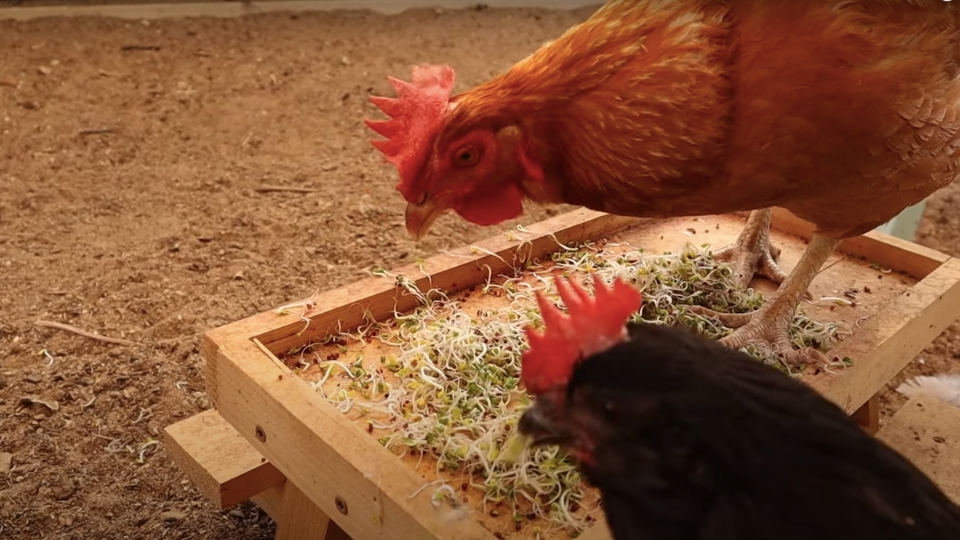
Proper Cleaning And Handling
Cleanliness and proper handling play a crucial role in preventing contamination and the spread of harmful bacteria. Before giving sprouts to your chickens, make sure to follow these cleaning and handling practices:
- Thoroughly wash your hands before handling sprouts or any chicken feed
- Wash all utensils and containers used for sprouting, ensuring they are clean and sanitized
- Use clean water when rinsing sprouts during the sprouting process to prevent the growth of bacteria
- Store sprouts in a cool, dry place and ensure they are not exposed to excessive moisture
- Regularly inspect the sprouts for any signs of mold, spoilage, or unusual odor. Discard any sprouts that do not appear fresh or safe for consumption.
By adhering to proper cleaning and handling practices, you minimize the risk of contamination and keep your chickens healthy and safe.
Frequently Asked Questions On Best Sprouts For Chickens
What Are The Easiest Sprouts To Grow For Chickens?
The easiest sprouts to grow for chickens are wheatgrass, sunflower sprouts, and alfalfa sprouts. These sprouts are simple to cultivate, provide essential nutrients, and are loved by chickens. They can be grown in small containers or trays and are ready to feed in a few days.
Are Sprouts Safe For Chickens?
Yes, sprouts are safe for chickens to eat. They provide essential nutrients and can be a healthy addition to their diet.
What Kind Of Bean Sprouts Are Good For Chickens?
Good bean sprouts for chickens include mung bean and lentil sprouts. They are packed with nutrients and easy to digest.
Final Word
Providing sprouts for your chickens can greatly enhance their nutritional intake and overall health. By incorporating a variety of sprouts like sunflower, alfalfa, and wheatgrass into their diet, you can ensure a good balance of vitamins, minerals, and antioxidants.
Additionally, sprouts are easy to grow and provide a cost-effective way to boost your chickens’ well-being. So, start sprouting today and watch your chickens thrive!
Video Source: https://www.youtube.com/watch?v=mmDZ0KaGzq0

